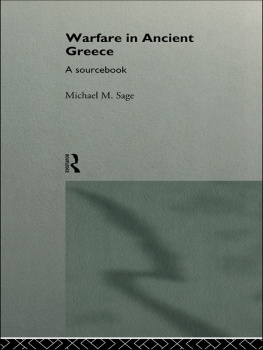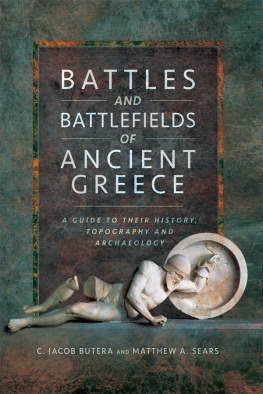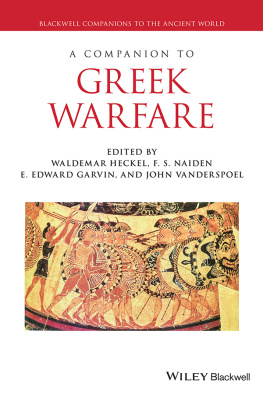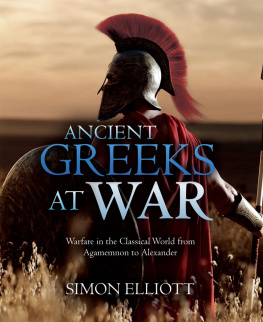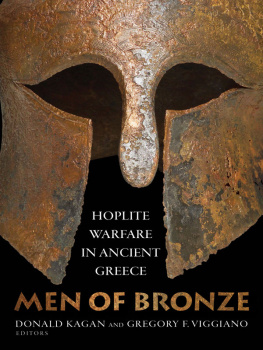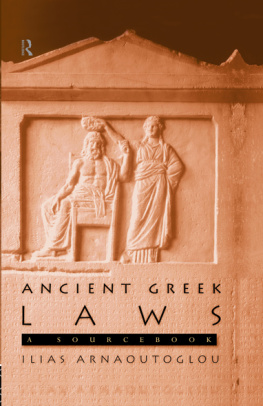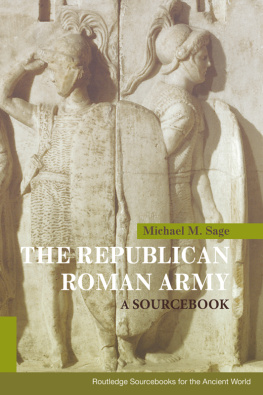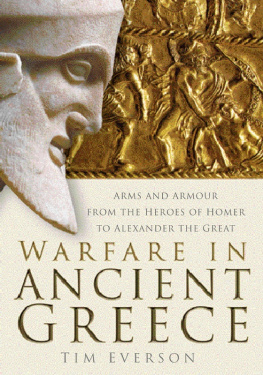WARFARE IN ANCIENT GREECE
A Sourcebook
Michael M.Sage
London and New York
First published 1996
by Routledge
11 New Fetter Lane, London EC4P 4EE
This edition published in the Taylor & Francis e-Library, 2003.
Simultaneously published in the USA and Canada
by Routledge
29 West 35th Street, New York, NY 10001
1996 Michael M.Sage
All rights reserved. No part of this book may be reprinted or reproduced or utilized in any form or by any electronic, mechanical, or other means, now known or hereafter invented, including photocopying and recording, or in any information storage or retrieval system, without permission in writing from the publishers.
British Library Cataloguing in Publication Data
A catalogue record for this book is available from the British Library
Library of Congress Cataloging in Publication Data
Sage, Michael M.
Warfare in ancient Greece: a sourcebook/Michael M.Sage.
p.cm.
Includes bibliographical references and index.
1. Military art and scienceGreeceHistory.
2. Military history, Ancient.
3. GreeceHistory, Military. I. Title.
U33.S24 1996
355.00938dc20 9539155
CIP
ISBN 0-203-43944-9 Master e-book ISBN
ISBN 0-203-74768-2 (Adobe eReader Format)
ISBN 0-415-14354-3 (Print Edition)
0-415-14355-1 (pbk)
For Jessica and Laura
ABBREVIATIONS
INTRODUCTION
The last quarter century has seen a renewed interest in the study of Greek and Roman warfare. This has developed as part of a more general revival of the place of war throughout the history of European society. An increasing number of books and journal articles bear witness to this trend. An important part of the revival has been a change of focus. Traditional military history has concentrated on strategy, tactics and the encounter of battle. A new perspective has emerged, however, that has led to a more comprehensive view of war as a social phenomenon whose outlines and substance are conditioned by the social and cultural system of those involved in making war. Studies have concentrated on the relationship between warfare and social solidarity and its links to sacral-religious views as well as on the ideology connected to fighting.
THE GREEK UNDERSTANDING OF WAR
This broadening of interest has led to the realization of the centrality of warmaking to Greek civilization and the profound formative effect it had on it. Satisfactory definitions of war and war-making are difficult to provide. At its center is the potential or actual use of violence by organized and politically independent groups. No definite line can be drawn to separate it from raiding and other organized violent activities. The Greeks themselves conceived of it as marked off from other pursuits by formal declarations and various symbolic and religious acts. The elaborate codes and procedures such as the erection of trophies or the asking for the bodies of the dead back to signify the acceptance of defeat are manifestations of this mentality (146, 153). In part such limitations reflected a desire to keep the human losses and the economic costs of warfare within limits that did not destroy the groups or states that waged them. The so-called heraldless war in which states opened hostilities without observing the traditional preliminaries was evidence of an intention to wage a total war that would lead to the extinction or total submission of the losing side. This institution throws into relief the importance of the normal mechanisms in containing the destructive effects of conflicts (128, 129, 153), though they were not always successful (168).
Though such limitations and boundaries may have checked the most destructive effects of conflict, it did little to restrain the frequency of war among Greeks states in the fifth and fourth centuries BC and into the Hellenistic period. Athens, the state we know best, was at war two out of every three years down to 338. Though we have no comparable figures for other Greek states, and Athens status as an imperial state for much of this period may have increased its involvement in war, the sources reveal that most states of any size were engaged in recurring conflicts with traditional or newly acquired enemies. The Greek view of relations between states reflected and justified this situation. Hostility was considered as the typical condition in Greek interstate relations and war and other forms of violence a normal expedient in political life (181). Further evidence for the normality of armed conflict is provided by the attempts of Greek intellectuals to analyze warfare. Though prone to generalization in other areas of political analysis, they offered no analysis of the causes of war. Rather they remained preoccupied with particular reasons for individual conflicts. It has been suggested, I think rightly, that the reason for such neglect was the view that war was simply a fact of human life and its ubiquity did not require explanation; only the specific reasons for a specific conflict warranted examination. Later periods of European history have also been marked by frequent war and violence but there were factors specific to Greek civilization that contributed to increase the frequency of armed conflict. The aristocratic ideology in the Homeric poems, which are among the earliest extant Greek literature, had as its center the idea of competition and struggle as the means to preeminence. Individual military success was the key area in which to achieve standing among a nobles peers and the most important measure of a mans worth (14). Developments in military tactics and equipment were to transmute and change the way this value system expressed itself but it remained intact and vital. In the Hellenistic period success in warfare was still the crucial element in legitimizing political power and remained the most important royal activity (271275). The agonal conception that underlay Greek attitudes to war is perhaps most clearly expressed in the continuation of archaic, ritualized struggle between the Argives and the Spartans for the border territory of Cynouria extending from the sixth century on (129). Though specifying the exact effect of such ideology is difficult, the emphasis it placed on struggle and military success created a predisposition to resort to warfare to resolve conflicts.
Warfare served other important functions, such as the acquisition of wealth in the form of land, money and slaves. From the Homeric period on, military activity was accepted as a source of profits and was practised for that reason. In the

